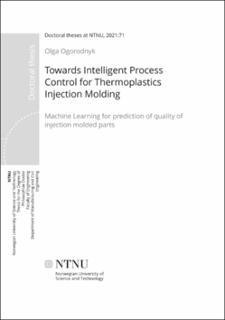| dc.description.abstract | Injection molding is a process that is widely used for production of plastic parts of different shapes, sizes and applications. Some of its advantages are high production rates and efficiency. However, to be able to produce parts of high quality and avoid in-process variations, high controllability and repeatability of the process are necessary. To achieve this, definition of critical process parameters that influence the final part quality and their proper values is necessary. Nowadays when starting production of a new part, these values are selected based on the injection molding machine operator’s experience using trial and error. Such method might be highly inefficient, requires a lot of time and results in production of scrap. To avoid this, a new approach to monitoring and control of the injection molding process is necessary.
In this PhD dissertation a framework for development of an intelligent control system for thermoplastics injection molding is created using systems engineering approach and prototypes of the system’s modules are developed. Such system would allow to turn the injection molding process data into manufacturing intelligence and allow to avoid trial and error method for selection of the proper process settings.
The dissertation aims to investigate the questions of (1) which injection molding process parameters are the most influential on different aspects of the injection molded parts’ quality (dimensions and physical properties); (2) how to create prediction models of dimensional (width and thickness) and physical properties (Young’s modulus (tensile modulus), tensile strength and tensile strain at break) of injection molded parts using Machine Learning methods; and (3) how to develop an intelligent control system for thermoplastics injection molding.
To answer the questions four experiments are conducted on “ENGEL insert 130” injection molding machine and 798 standard dogbone specimens are produced (72 of the specimens are with 15 mm thickness, while 726 are with 4 mm thickness). The specimens with 15 mm thickness are produced only during experiment 2. Virgin HDPE material is used in the first two experiments, while recycled material from two different suppliers is used in experiments 3 and 4. The experiments are conducted using designs of experiment (DOE). 8 parameters are included in the first experiment’s DOE, 7 in the second one and 6 in the DOE used for both experiments 3 and 4. Machine and process parameters data is logged during the dogbone specimens’ production: 41 parameters during experiment 1, 65 parameters during experiment 2 and 52 during experiments 3 and 4. To collect the data, a systematic data acquisition approach is proposed in the dissertation. It includes guidelines for collection of the data during and after the production process.
After the data collection is completed, data cleaning, integration, normalization and feature selection are performed in order to obtain high-quality datasets and as the main data preprocessing steps. The datasets are then used to develop machine learning models for prediction of dimensions and physical properties of the dogbone focus parts. The resulting prediction models are:
A Random Forest predictive model with R2 = 0.95, RMSE = 0.05 and correlation coefficient = 0.94 for dimensional properties (width and thickness).
A Random Forest predictive model with R2 = 0.92, RMSE = 28.32 and correlation coefficient = 0.97 for mechanical properties (tensile modulus, tensile strength, tensile strain at break).
A model for prediction of dimensional deviations developed using the Random Forest machine learning method with R2 = 0.92, RMSE = 0.06 and correlation coefficient of 0.94.
The framework for development of an intelligent control system for thermoplastics injection molding is proposed based on the results obtained during the experimental work and analysis of the gathered data, as well as using the model-based systems engineering approach. The modules used for data acquisition, data preprocessing and the machine learning models creation are prototypes of the intelligent system’s modules. Such system allows to gather the injection molding process data of interest, select the most influential process parameters using feature selection machine learning methods, as well as develop the quality prediction models. The models can be then used to select the proper process parameter values without use of the resource consuming trial and error method. | en_US |
